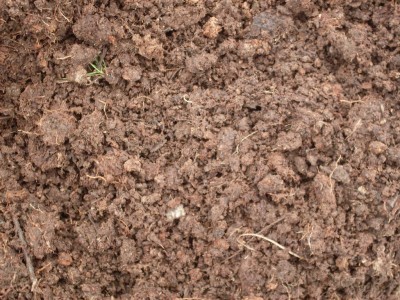






A successful organic garden is dependent upon the quality of the soil. Poor soil yields poor crops, while good, rich soil will allow you to grow prize-winning plants and vegetables. Here are a few ideas for adding organic matter to soil to help provide the nutrients it needs for an abundant harvest.
Adding organic matter to soil for organic gardens is crucial in the health of your plants. Here are some common organic soil amendments for creating healthy garden soil.
It doesn’t matter which article you read or which organic gardener you talk to, they will all tell you the same thing; an organic garden begins with compost. Compost is simply deteriorated, rotted organic matter. It can be made with household cooking scraps, leaves, grass clippings, etc. The longer your compost bin cooks, the better the resulting compost will be. Most gardeners recommend at least a year.
Compost is worked into the existing soil before spring planting and can be added later in the summer if you plan a fall garden. The nutrients from the compost will help ensure strong healthy plants. Healthy plants are less likely to be devastated by bugs or disease.
Manure is another popular fertilizer among gardeners for adding organic matter to soil. The droppings from cows, horses, goats, rabbits, and chickens are all considered to be viable manure for your garden. Manure can be purchased from garden centers, or if you are lucky enough to live near a rural area it can be purchased directly from the stock owner at a more reasonable price.
Beware of putting fresh manure on your garden space as it can burn the plants. This is best applied in late fall after all plants have been harvested or added to your compost pile to age.
There are a number of other organic soil fertilizers you can add to the garden. Fish emulsion and seaweed extract, while expensive, can do wonders for your soil. Bone meal is another, somewhat cheaper, alternative.
Comfrey is yet another option, which in addition to manure or compost, can be given to plants in the form of tea. All of these options provide much-needed nutrients, especially if compost or manure is not available.
After your soil has been prepared, you are ready to plant. If you are like most gardeners, you will already have many plants started, like tomatoes and peppers. Once you have them spaced the proper distance in the garden, your next step is to mulch.
Mulching is the practice of using straw, hay, or even shredded newspaper around the plants in order to keep weeds from overtaking your garden. Most gardeners apply a layer of mulch all around the plants and in the walkways to deter the growth of unwanted plants.
For plants you start directly from seed in your garden, you should wait until they have broken the ground before you mulch. This makes it easier to thin the plants to the proper distance apart and can allow you to see which plants appear to be the strongest. Once thinned, apply mulch as you did for the seedlings.
At the end of the growing season and following the harvest, till the mulch directly into your garden plot. Tilling will help the soil retain much needed moisture and keep the organic garden soil workable.
The soil in some locations can be so poor that topsoil will need to be purchased in order to even begin a garden. You can have your soil tested by taking a sample to your local county extension office. They can tell you what nutrients your soil is missing and give you further guidance on how to improve the type of soil you have. Generally, there is no charge for this service.
Keeping your soil healthy and nutrient-loaded without the use of chemical fertilizers is a bit more work. Yet, at the same time, you know exactly what is in your garden, and the results will be quality fruits and vegetables that you can eat without worrying about chemical residue. Trust me, nothing tastes better than biting into a red, ripe tomato right off the vine when you finish your morning weeding.
Copyright © www.100flowers.win Botanic Garden All Rights Reserved